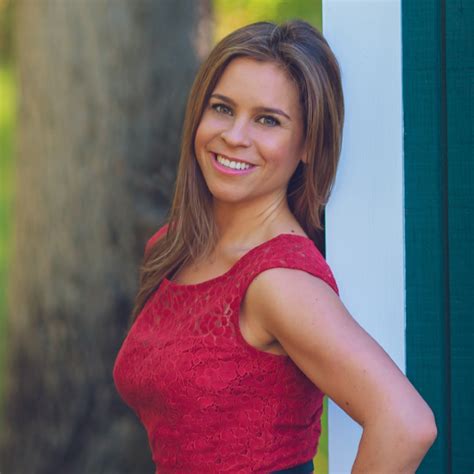A Quote by Deepak Chopra
When our identity comes from the self, then we keep our energy to ourselves. We feel energetic, we feel powerful, and we experience youthful vigor.
Related Quotes
Because we haven’t been taught to appreciate and love ourselves in this way, we don’t feel like we deserve self-care and pleasure. Instead, we cling to our To Do lists and sacrifice our health and well-being for the sake of others. Then, when we feel deprived of our basic human need for relaxation and enjoyment, we turn to food as our sole source of pleasure. When we then try to deprive ourselves of food through dieting, we deny the last bit of pleasure we have in our lives. And that strategy never works!
If we only identify with the mortal world, then we identify with a level of scarcity and lack and brokenness, and that will be our experience. But if we shift our experience of self-identification - and this is what enlightenment is - from the body-self to the spiritual-self, then we place ourselves under an entirely different set of possibilities and probabilities.
People mistake self-love for thinking they must always like what they see in the mirror - and yes, of course, that is the goal; that all depends on perspective - but my argument is that you can still have self-love while wanting to make progress or improve things. The main issue is that we attach too much to an idea of what our perfect body may be or what self-love should be. But that's the issue. There is no right or wrong. We can love ourselves and feel bloated. We can love ourselves but feel uncomfortable in our skin. We are a work in progress and human and won't always feel amazing.
I'm beginning to feel that the real endangered species on planet earth are not the whales and the elephants but those of us who can laugh at the world and ourselves. ... I fear the dry turn of the American mind, this focus on the literal, as much as I fear our capacity for self-destruction. We've become hagridden by facts, obsessed with product instead of process. Where's the energetic wit, the looney outlook, the frivolity, the lightness of comforting laughter? It has become fashionable to know and unfashionable to feel, and you can't really laugh if you can't feel.
The biggest adversary in our life is ourselves. We are what we are, in a sense, because of the dominating thoughts we allow to gather in our head. All concepts of self-improvement, all actions and paths we take, relate solely to our abstract image of ourselves. Life is limited only by how we really see ourselves and feel about our being. A great deal of pure self-knowledge and inner understanding allows us to lay an all-important foundation for the structure of our life from which we can perceive and take the right avenues.
The idea that somehow "no self, no problem"- I don't exist because I don't have a self- would be a mistaken understanding. However, the selflessness teaching is not that hard to understand. What it means is a type of self that people feel they have, like a fixed, unchanging identity. Either they know they have it, or for some, they feel they need to seek it, and possibly have an experience where they feel like they found something. That type of fixed, unchanging, essential self, or absolute self doesn't exist. That's what "no self" means.
It is possible to move through the drama of our lives without believing so earnestly in the character that we play. That we take ourselves so seriously, that we are so absurdly important in our own minds, is a problem for us. We feel justified in being annoyed with everything. We feel justified in denigrating ourselves or in feeling that we are more clever than other people. Self-importance hurts us, limiting us to the narrow world of our likes and dislikes. We end up bored to death with ourselves and our world. We end up never satisfied.
Many of our feelings of satisfaction or dissatisfaction have their roots in how we compare ourselves to others. When we compare ourselves to those who have more, we feel bad. When we compare ourselves to those who have less, we feel grateful. Even though the truth is we have exactly the same life either way, our feelings about our life can vary tremendously based on who we compare ourselves with. Compare yourself with those examples that are meaningful but that make you feel comfortable with who you are and what you have.
At our most elemental, we are not a chemical reaction, but an energetic charge. Human beings and all living things are a coalescence of energy in a field of energy connected to every other thing in the world. This pulsating energy field is the central engine of our being and our consciousness, the alpha and the omega of our existence.
It seemed an advantage to be traveling alone. Our responses to the world are crucially moulded by the company we keep, for we temper our curiosity to fit in with the expectations of others...Being closely observed by a companion can also inhibit our observation of others; then, too, we may become caught up in adjusting ourselves to the companion's questions and remarks, or feel the need to make ourselves seem more normal than is good for our curiosity.
Our prayer must not be self-centered. It must arise not only because we feel our own need as a burden we must lay upon God, but also because we are so bound up in love for our fellow men that we feel their need as acutely as our own. To make intercession for men is the most powerful and practical way in which we can express our love for them.
But how can we love someone if we don't like him? Easy-we do it to ourselves all the time. We don't always have tender, comfortable feelings about ourselves; sometimes we feel foolish, stupid, asinine, or wicked. But we always love ourselves: we always seek our own good. Indeed, we feel dislike toward ourselves, we berate ourselves, precisely because we love ourselves; because we care about our good, we are impatient with our bad.




































